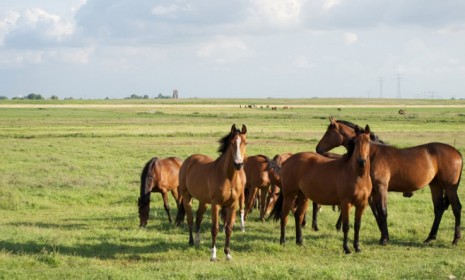Should the U.S. start slaughtering horses again?
With an estimated 140,000 American horses slaughtered outside the country each year, some say its time to lift a ban and allow the practice at home

A free daily email with the biggest news stories of the day – and the best features from TheWeek.com
You are now subscribed
Your newsletter sign-up was successful
It has been five years since the last U.S. slaughterhouse that killed horses for human consumption closed, but the de facto ban hasn't reduced the number of American horses killed for their meat. Every year, some 140,000 American horses are shipped — typically to Mexico or Canada, and sometimes under cruel circumstances — to be killed and butchered, then served for dinner in Europe or Asia. Lobbyists are pushing Congress to either prohibit shipping horses abroad for slaughter, or to again allow the practice in the U.S. Should the horse-slaughtering industry ride again?
Yes, a horse is no different than a cow: "A horse, to me, is a livestock animal like a cow, sheep or a goat," says Orbie Bonnett, a rancher in Nebraska who used to sell horses to slaughter, as quoted in The New York Times. Some people, especially "money folk," think of horses as pets, like dogs or cats, but when they got the domestic processing plants closed they shut down a $65 million industry and took away the livelihood of many horse people.
"Slaughter of horses goes on, just not in U.S."
The Week
Escape your echo chamber. Get the facts behind the news, plus analysis from multiple perspectives.

Sign up for The Week's Free Newsletters
From our morning news briefing to a weekly Good News Newsletter, get the best of The Week delivered directly to your inbox.
From our morning news briefing to a weekly Good News Newsletter, get the best of The Week delivered directly to your inbox.
And it's cruel not to allow slaughter: "You see a lot of malnourished and abandoned horses that probably would have been humanely slaughtered before," says Nebraska horse trainer Windy Allen, as quoted in The New York Times. Letting horses starve when people can't afford to keep them is more cruel than killing them quickly for their meat. And if you think the practice barbaric, says New York chef Hugue Dufour, who cooked horse meat when he worked in Canada, "it's slightly hypocritical" to let some horses "be slaughtered anyway up in Canada or Mexico."
"Slaughter of horses goes on, just not in U.S."
No, slaughtering horses is inhumane: The horse slaughter business is "a disreputable, predatory industry, gathering up horses from all sorts of sources and turning them into meat exports for profit," says Wayne Pacelle, president and CEO of The Humane Society of the United States, at his A Humane Nation blog. Those in the industry may claim otherwise, but they actually stand in the way of helping unwanted horses find homes, by outbidding rescue groups at auction. It's just a good thing "there's no active slaughter industry for dogs and cats."
"Rhapsody's story and the ugly truth about horses laughter"
A free daily email with the biggest news stories of the day – and the best features from TheWeek.com
Butchering horses just makes Americans queasy: "There's no settled explanation for why most Americans are perfectly willing to eat cows, pigs, and chickens but turn their noses up at horse," says Brian Palmer at Slate. Dining on horse steak is just taboo here, while many Europeans think nothing of it. But maybe they're the weird ones — eating horse was frowned on there for a millennium before it became acceptable again in the 1800s. In the 8th century, Pope Gregory III called it a "filthy and abominable custom."
-
 Political cartoons for February 20
Political cartoons for February 20Cartoons Friday’s political cartoons include just the ice, winter games, and more
-
 Sepsis ‘breakthrough’: the world’s first targeted treatment?
Sepsis ‘breakthrough’: the world’s first targeted treatment?The Explainer New drug could reverse effects of sepsis, rather than trying to treat infection with antibiotics
-
 James Van Der Beek obituary: fresh-faced Dawson’s Creek star
James Van Der Beek obituary: fresh-faced Dawson’s Creek starIn The Spotlight Van Der Beek fronted one of the most successful teen dramas of the 90s – but his Dawson fame proved a double-edged sword